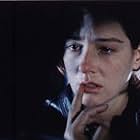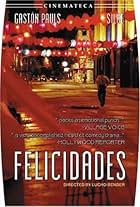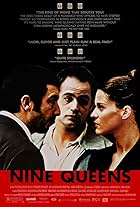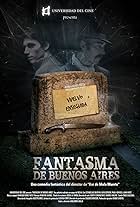La suerte está echada
- 2005
- 1h 37m
IMDb RATING
7.2/10
1.1K
YOUR RATING
A story about two brothers and how they deal with everything life bringsA story about two brothers and how they deal with everything life bringsA story about two brothers and how they deal with everything life brings
- Awards
- 2 wins & 3 nominations
Photos
Daniel Topino
- Suicida
- (as Daniel Toppino)
Noralíh Gago
- Asistente Maribel
- (as Noralih Gago)
- Director
- Writer
- All cast & crew
- Production, box office & more at IMDbPro
Storyline
Featured review
When I was reading an interview with Sebastian Borensztein several days ago in the newspaper "La Nación", and was understanding that he had chosen the cinema for not turning back, I realized that "the luck was tossed" for him, and that his first film, "La suerte está echada" ("The luck is tossed"), would be an interesting project. He began writing from nowhere, he says. He also comments that he knew the ending but he didn't know how he'd develop it. Anyway, his own script relates the history of two half brothers that don't seem to meet very often, and get together to complete their father's (José Gallardou) last will; and what will
One of them is Felipe (Marcelo Mazzarello), a theater not very renowned theater actor who lives of his passion. He runs in the morning, breathes the air of the city, and when he's not home his answering machine announces: "And the Oscar goes to ". The sentence finishes with his name and the tone to leave the message. But this morning, when he goes running, something is foreseen strange. There's no one in the streets, everything's deserted What occurs to him that day, unchains what is maybe the main axis of the story; the luck or, in the case of Felipe, the bad luck, because he is "mufa."
Guillermo(Gastón Pauls), on the other side, can't reconcile his dream due to the alarm of an isolated car that doesn't cease to sound at nights; what leads to his late arrivals at work, where he has a very important position. To this we add his relationship with Clara (Julieta Cardinali),that seems to go worse than the day before. However, in the moment of the brothers' encounter those topics are not touched. After listening their father's order, they leave outside and their chat is limited to Guillermo's first question: "How are you?". "Great", Felipe responds him. "And you, how are you? ", asks the other one now; and after doubting Guillermo answers: "Great".
These two actors carry the weight of the whole movie, and they fulfill their task without problems. Marcelo Mazzarello is that actor we never mention, but we know he's there. His abilities are showy, although surprisingly it is said that Borensztein wrote Felipe's role thinking of him. Maybe it was made to his measure, but in one way or another, his interpretation is remarkable. Then there's Gastón Pauls, who always worries about giving a different personality to his characters, and when composing the characteristics of these, ends up with something different but still incredible; even when he played himself in that beautiful movie that is "Sábado" ("Saturday").
The moment narrated previously and other more (the one of the robbery, the one of the meeting with the "mufas", the one of the theatrical casting) show Borensztein's capacity to write comedy. With very simple shots, his objective is not to unite the brothers, who live their separately. The script of his dramatic comedy doesn't want to move anybody, neither to put things that sound right; escaping like that from the pretentious (in moments where it could have happened, like in the speeches about the luck) and culminating in something completely fresh in times of first features as the intentionally complex "Un Buda". Alejandro Lerner's music also highlights, because it is not a strategy for taking us to the cinema for his songs, when the music doesn't speak a single word, relating with the character's state of spirit and reviving only musical times of the experienced artist.
In other words, the director knows that he didn't come to make a work of art, or at least he doesn't pretend to; therefore I deduce that it will be a pleasure to have him in our cinema during the next years.
One of them is Felipe (Marcelo Mazzarello), a theater not very renowned theater actor who lives of his passion. He runs in the morning, breathes the air of the city, and when he's not home his answering machine announces: "And the Oscar goes to ". The sentence finishes with his name and the tone to leave the message. But this morning, when he goes running, something is foreseen strange. There's no one in the streets, everything's deserted What occurs to him that day, unchains what is maybe the main axis of the story; the luck or, in the case of Felipe, the bad luck, because he is "mufa."
Guillermo(Gastón Pauls), on the other side, can't reconcile his dream due to the alarm of an isolated car that doesn't cease to sound at nights; what leads to his late arrivals at work, where he has a very important position. To this we add his relationship with Clara (Julieta Cardinali),that seems to go worse than the day before. However, in the moment of the brothers' encounter those topics are not touched. After listening their father's order, they leave outside and their chat is limited to Guillermo's first question: "How are you?". "Great", Felipe responds him. "And you, how are you? ", asks the other one now; and after doubting Guillermo answers: "Great".
These two actors carry the weight of the whole movie, and they fulfill their task without problems. Marcelo Mazzarello is that actor we never mention, but we know he's there. His abilities are showy, although surprisingly it is said that Borensztein wrote Felipe's role thinking of him. Maybe it was made to his measure, but in one way or another, his interpretation is remarkable. Then there's Gastón Pauls, who always worries about giving a different personality to his characters, and when composing the characteristics of these, ends up with something different but still incredible; even when he played himself in that beautiful movie that is "Sábado" ("Saturday").
The moment narrated previously and other more (the one of the robbery, the one of the meeting with the "mufas", the one of the theatrical casting) show Borensztein's capacity to write comedy. With very simple shots, his objective is not to unite the brothers, who live their separately. The script of his dramatic comedy doesn't want to move anybody, neither to put things that sound right; escaping like that from the pretentious (in moments where it could have happened, like in the speeches about the luck) and culminating in something completely fresh in times of first features as the intentionally complex "Un Buda". Alejandro Lerner's music also highlights, because it is not a strategy for taking us to the cinema for his songs, when the music doesn't speak a single word, relating with the character's state of spirit and reviving only musical times of the experienced artist.
In other words, the director knows that he didn't come to make a work of art, or at least he doesn't pretend to; therefore I deduce that it will be a pleasure to have him in our cinema during the next years.
- jpschapira
- Aug 16, 2005
- Permalink
Details
- Release date
- Country of origin
- Official site
- Languages
- Also known as
- The Die Is Cast
- Filming locations
- Production companies
- See more company credits at IMDbPro
- Runtime1 hour 37 minutes
- Color
- Sound mix
Contribute to this page
Suggest an edit or add missing content

Top Gap
By what name was La suerte está echada (2005) officially released in Canada in English?
Answer


















